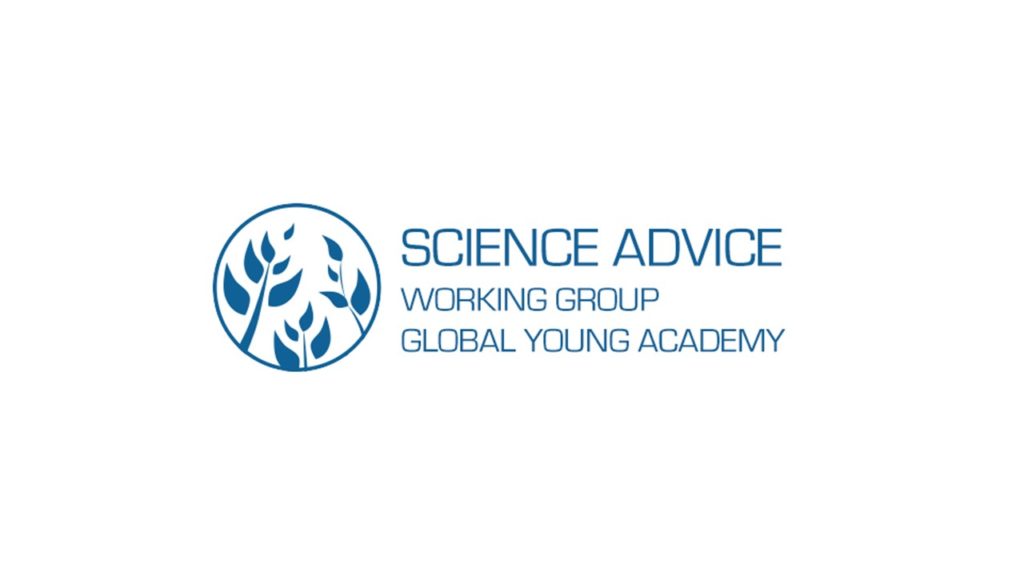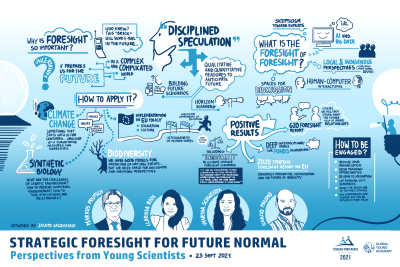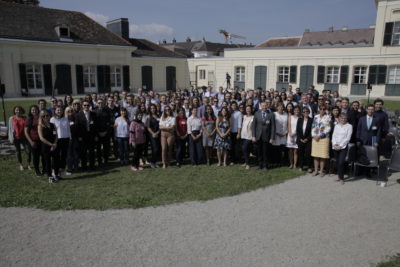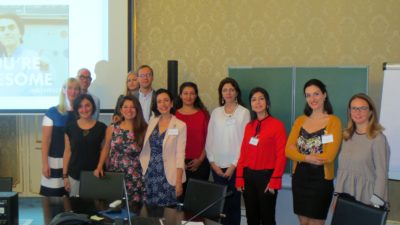
Science Advice working group aims to support, empower, and connect early-career researchers across disciplines in policy-making globally by training, educating, and informing them about (inter)national science-policy interfaces within and beyond GYA.
Science Advice is essential at this point in history. The current social movement towards post-science, post-truth and post-factual decision making is dangerous and may have deleterious long term consequences to our collective future. It is important that we, early and mid-career scientists, work closely with decision makers to emphasise the importance of consulting with specialists to help inform decisions.
Our GYA Science Advice working group aspires towards
– attaining a deeper level of understanding of science advice and the involvement by stakeholders,
– building capacity in science advice for policy making for young scientists and policy makers,
– organising concrete actions and building a community of young scientists and decision makers around this topic.
Watch the group’s video for the 2020 GYA e-Annual General Meeting here
We have launched several initiatives and activities related to science advice. We participated in JRC and INGSA meetings, wrote a report together, and gave advice on the INGSA Science Advice Manifesto.
For a list of group co-leads since the group was established in 2017, see here.
In December 2023, INGSA launched their “Science Advice Knowledge Hub” as well as a “Resource Library“, as repositories of Tools, Resources, and Research on Science Advice and Science Diplomacy.
N/A
The GYA Science Advice Resource Centre is a platform that provides basic information on Science Advice. This platform is intended to be an initial entry point for Early-Career Researchers into Scientific Advice matter.
Go to the GYA Science Advice Resource Centre
Ongoing Projects 2024/25
In June 2025, group co-lead Jovana V. Milić together with several Young Academies from Europe, organised a workshop on “Science for Policy and Diplomacy for Early-Career Scientists in Europe” during the 2025 meeting of Young Academies in Europe (ENYA), with group members Laura Zimmermann and Estrella Diaz Sanchez, as well as GYA YASAS Observer Stella Tsani, contributing as panellists.
In May 2025, co-lead Jovana V. Milić participated in a panel discussion at the European Science Advice Mechanism (SAM) conference in Vienna, Austria, organized by the International Science Council (ISC) on the subject of “Unlocking science advice: building skills and practices for young scientists in Europe”. This interactive session explored innovative approaches and science-policy mechanisms to connect universities and municipalities, drawing on practical examples to address urban challenges like socio-economic development, inequality, depopulation or overpopulation, digital transformation, and climate change. Speakers came from several Young Academies, the Marie Curie Alumni Association, the IIASA, and the European Commission.
In March 2025, group co-lead Jovana Milic attended the INGSA-Europe inaugural conference in Oxford, UK. Jovana is an INGSA-Europe Advisory Board Member and at the conference, she co-moderated a session on “Connecting Across Generations” together with Wim van Saarloos (Chair of the European Academies Science Advisory Council, EASAC). The panel discussed challenges and opportunities for engaging early- to mid-career researchers in European science advice and the prospective role of INGSA-Europe. You can read a report here.
In December 2024, group co-lead Melina Flórez Cuadros participated in the CILAC 2024 (Foro Abierto de Ciencias de Latinoamérica y el Caribe – CILAC) in Colombia, where she presented the Declaration of Leticia: a manifest for science with social impact in Latin America and the Caribbean. You can read more about CILAC 2024 and the GYA members’ contributions here.
In October 2024, group co-lead Jovana Milic participated in the Geneva Science Diplomacy Anticipator (GESDA) Summit, which brought together 1000 scientists, diplomats, policymakers, and others from around the globe in a dialogue on using science and the acceleration of new technologies in addressing some of the global challenges. Read a brief report here.
In June 2024, in collaboration with the Trust in Science Working Group Co-Lead, Leila Niamir, the Science Advice working group members, including Jovana V. Milic and alumina Isil Kurnaz, were contributing to a panel discussion during the “Science Diplomacy and Sustainable Development” symposium organised by the Turkish Academy of Sciences and the Association of Academies and Societies of Sciences in Asia (AASSA) in Istanbul.
In June 2024, the Science Advice working group members, Markus Prutsch and Jovana V. Milic, were contributing to the meeting of the Swiss Young Network for Science Policy and Diplomacy (SYNESPOD) in Geneva during the Geneva Science Diplomacy Week, discussing the challenges and opportunities for engaging early-career researchers in science for policy and diplomacy worldwide.
 In May and June 2024, members from the group contributed to a 3-months project led by the Mauritius Academy of Science and Technology (MAST) on “Strengthening science advice capability of the Mauritius Academy of Science and Technology (MAST): focusing on food security”. You can read more here.
In May and June 2024, members from the group contributed to a 3-months project led by the Mauritius Academy of Science and Technology (MAST) on “Strengthening science advice capability of the Mauritius Academy of Science and Technology (MAST): focusing on food security”. You can read more here.
In May 2024, as part of the 2024 GYA Annual General Meeting and Conference in Washington DC, USA, in May 2024, the GYA working group on Science Advice organised a hybrid workshop session on “GYA Science Advice Masterclass: a global transdisciplinary approach”, with Laura Zimmermann as one of the opening speakers and Jovana V. Milic as a moderator. Partners for this training workshop included speakers from the International Science Council (ISC), the African chapter of the International Network for Government Science Advice (INGSA Africa), and the Geneva Science and Diplomacy Anticipator (GESDA). Workshop participants came from the GYA membership, as well as GYA alumni and Office staff. Additionally, members of the US Young Academy, the US New Voices, as well as participants from partner organisations were also invited.
In April 2024, some of the members of the working group started the discussion of contributing to the activities in the domain of Science Diplomacy through collaboration across GYA Working Groups and international partners. The discussion is ongoing toward the realisation of the initiative in the future.
In January 2024, the continuation of the collaborative project with the Swiss Young Network for Science Policy and Diplomacy (SYNESPOD) was approved, and the group started planning joint initiatives and contributions to international events.
In December 2023, group co-lead Jovana Milic was a panelist at a session on “The Role of Academies in Climate Policy Advice” at COP28 in Dubai.
In September 2023, group co-leads Laura Zimmermann and Jovana V. Milić, as well as former co-lead Markus Prutsch, participated in an international hybrid meeting for Swiss Young Network for Science Policy and Diplomacy (SYNESPOD) project in Bern, Switzerland, discussing challenges and opportunities for early-career researchers at the science-policy interface.
In September 2023, the Global Sustainable Development Report (GSDR) was officially released. It highlights the effect of the pandemic on reaching the SDGs as well as the need for a big concerted effort by all stakeholders to reach them by 2030. Group co-lead Laura Zimmermann was part of the International Science Council (ISC) working group coordinating the peer review process for this report.
In June 2023, the working group organised two workshops at the GYA Annual General Meeting in Kigali, Rwanda. This involved an introductory workshop on international science advice with several international experts and GYA members, including Markus Prutsch, Alma Hernández-Mondragón, David Mair (Joint Research Center, European Commission), Christian Acemah (INGSA Africa, Executive Director of the Uganda Academy of Sciences) and Yangyang Cheng (Yale Law School, Research Scholar in Law and Fellow, Tsai China Center). The program was complemented by an advanced workshop featuring group discussions and expert opinion by invited speaker Binyam Sisay Mendisu (INGSA and UNESCO International Institute for Capacity Building in Africa, GYA alumni), discussing the impact of covid-19 pandemic on science advice and trust in science. Read the full report here.
In May 2023, group co-leads organised a GYA-internal online discussion about Trust in Science Advice together with the GYA Trust in (Young) Scientists working group. A brief report and some slides are here. This online event will provided an open platform for discussion with GYA members as panelists and participants, who shared their experiences from different world regions on building trust in science and science advice. Representatives of both working groups moderated the discussion to facilitate the conversation and highlight challenges and opportunities for building trust in science advice globally.
In February 2023, the group kick-started a collaborative exchange with the Swiss Young Academy in the scope of the project Swiss Young Network for Science Policy and Diplomacy (SYNESPOD) led by the group co-lead Jovana V. Milić. This collaboration will involve sharing experiences and initiatives in the engagement of young scientists in science policy and diplomacy toward sustainable development globally.
In Fall 2022, group co-lead Laura Zimmermann became a member of the International Science Council (ISC)’s working group coordinating the review process of the 2023 Global Sustainable Development Report (GSDR). The GSDR provides evidence-based guidance on global sustainable development issues and progress towards the implementation of the 2030 Sustainable Development Goals and will be launched in 2023. The working group, consisting of 13 researchers from the natural and social sciences, was tasked with coordinating and synthesizing global feedback on the GSDR draft from over 100 expert reviewers for communication to the United Nations Department of Economic and Social Affairs (UNDESA).
In September 2022, co-lead Markus J. Prutsch as well as group member Felix Moronta together with alumnus Andre Xuereb gave a presentation on the topic of science diplomacy and science advice at the GYA online event “Young and Global – A perspective on today’s challenges in science”. This event was part of the Science Summit of the United Nations General Assembly (UNGA77). In their presentation, they explored how stronger relationships between nations help both advance the course of science, and science can help bring nations together. Early-career researchers (ECRs) are in a unique position to forge long-lasting connections between scientists, diplomats, and policymakers, and to use science diplomacy to help bridge societal and technological gaps. Read more about the session and watch the full presentation here.
In June 2022, group members organised a Science Advice for Policy-making Workshop as part of the GYA Annual General Meeting & Conference, in collaboration with the Young Academy of Japan. INGSA and INGSA-Asia provided mentors and more than 40 participants took part in the meeting. You can watch the recording here. For further information, you can read the related news item here.
Furthermore, the Science Advice Resource Centre was launched. This platform is intended to be an initial entry point for early-career researchers into Scientific Advice matters.
In May 2022, the group, in collaboration with INGSA-Africa, organised a workshop intended to provide participants with an overview of the concept of “science advice”, with a focus on the use of science advice during the COVID-19 pandemic in relation to traditional knowledge in Africa, and on examining existing platforms and structures of science advice in Africa, as well as in Europe and Latin America. The workshop was held online.
In April 2022, group co-lead Alma Cristal Hernández (Mexico), and group members Felix Moronta (Venezuela), Sandra López-Verges (Panama), Luciana Balboa (Argentina), Fernando Valiente (Chile), as well as GYA alumnus Alex Godoy (Chile) organised and participated in the Regional Conference on Science Advice in Latin America. The objective of the Conference was to provide students and young researchers with an introductory perspective on Science Advice, and on the participation of young Latin American scientists in crises such as the COVID-19 pandemic in their countries of residence, and on other countries’ global challenges facing the Latin-American region and the world in general.
In September, the group’s Science Advice Writing Contest closed and the winners were announced. The contest contributions were then included in the Science Advice Resource Centre that was under development.
Additionally, the group participated in the Tsukuba Conference for Future Shapers 2021 (online). Four foresight practitioners from the GYA shared their experience and examined innovative approaches anticipating the future of scientists in the Panel Session “Strategic Foresight for the “future normal” of young scientists ”. Furthermore, group members participated in the Special Plenary with Nobel Laureates during the conference. Read the group’s item for the GYA Blog here.

In July, the group collaborated with the Journal of Science Policy & Governance and co-organised the International Science Policy Memo Writing Workshop to equip students and early-career scholars to write effective and impactful policy memos.
In November 2020, the group teamed up with Policy Horizon Canada in order to provide an online training workshop on Strategic Foresight addressed to GYA members and alumni, as well as to National Young Academy members. For details see here.
Group co-lead Alison Flynn (University of Ottawa, Canada) participated in an INGSA Workhop on science advice and leadership in Addis Abeba, Ethiopia, in October 2019. A workshop report can be found here.
Prior to the GYA Annual General Meeting and International Conference of Young Scientists 2019, a pre-conference workshop on science advice for early to mid-career researchers and scientists was held at the Halle Institute for Economic Research (IWH), in cooperation with this GYA working group and the International Network for Government Science Advice (INGSA).
Working group co-lead Clarissa Rios (Peru) represented the GYA at the 2019 annual ‘Science meets Parliaments’ conference at the European Parliament in Brussels in February 2019. This event, organised by the European Parliament and the European Commission’s Joint Research Centre (JRC), gathered policy-makers, scientists and professionals working at the interface of science and policy. Read more here.
In November 2018, members of the group participated in the biennial conference of the International Network for Government Science Advice (INGSA) in Tokyo, Japan. For a brief report see here.
Furthermore, the group co-organised an Evidence and Policy Summer School together with the International Institute for Applied Systems Analysis (IIASA), the European Commission’s Joint Research Centre (JRC), and the International Network for Government Science Advice (INGSA) in Laxenburg, Austria, in September 2018. The summer school’s theme was “The role of population and migration for sustainable development in the European neighbourhood”. It focused on the role of population and migration for sustainable development in the European Neighbourhood, and it was aimed at early- to mid-career scientists interested in how to achieve impact on policy-making, as well as at policymakers interested in how to commission and use research in their daily work.
One of the panel sessions, “Discussion with Scholars At Risk”, was moderated by GYA member and co-lead of the At-Risk Scholars Initiative, Karly Kehoe (Canada). It was a collaboration between the GYA and the Young Academy of Scotland (YAS) and offered at-risk professionals a platform for highlighting how their personal and professional lives have been affected by their forced displacement. The panelists were Pinar Aksu (YAS member), Mohammed Almahfali (GYA mentee), and Özge Yaka (GYA mentee). Session participants were instructed to treat the first half of the session as a listening exercise and to consider how the experiences of the speakers fit within the broader context of migration and demographic change in Europe.
Following this, the audience was then tasked with breaking up into groups and discussing a number of policy recommendations that emerged from the GYA’s Global Migration and Human Rights working group’s Global Individual Responsibility Symposium held in Munich, Germany, in April 2018. The purpose of this exercise was twofold: firstly, to encourage discussion about migrant integration between policy makers, migrants and researchers; secondly, to capture the advice and comments made by the policymakers to ensure that the recommendations being included in the GMHR working group’s forthcoming report, Global Individual Responsibility: The Role of the Citizen in Refugee Integration are as concrete as possible.

© FFAB | IIASA
GYA members Cristina Blanco Sío-López (UK) and Clarissa Ríos (Peru) facilitated a master class on “Human Mobility and European integration: From Qualitative Approaches to Citizens’ Engagement”.

2016
The foundations for this group were laid at the 2016 workshop Broadening the scope of science advice (GYA/INGSA/JRC) and the 2016 conference Science & Policy Making: Towards a New Dialogue (INGSA/EC) both held in Brussels. We then started out as a GYA Incubator and were officially established as a GYA Working Group in January 2018.